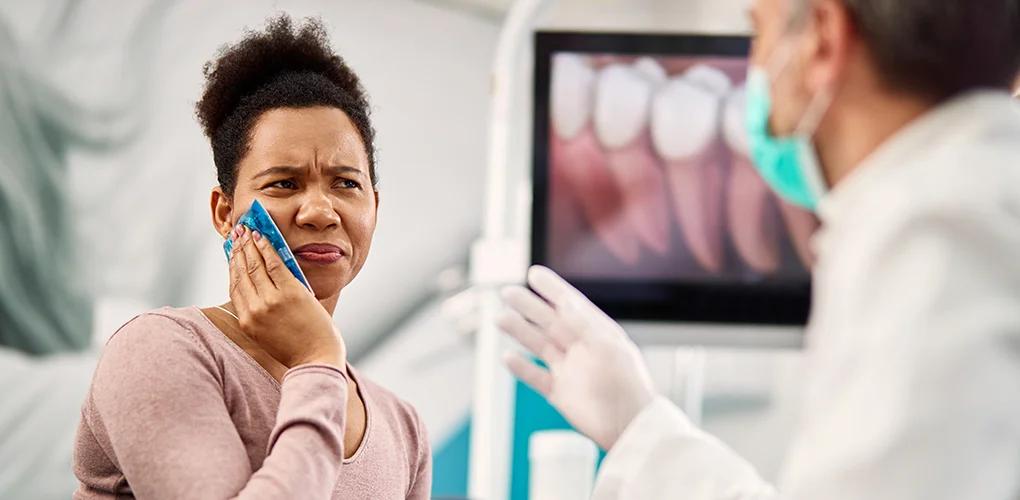`
Jaw Pain and Its Hidden Triggers: What You Need to Know
Jaw discomfort is a painful condition that impairs speech and eating. Jaw pain can occur either on one side or both sides of the jaw. With thorough examination and investigation, a diagnosis of the exact cause of pain can be determined. Sinus infections, ear infections, or damage to the jawbone can result in jaw pain. The intensity and cause may affect the course of treatment. An ice pack can be used as a kind of treatment, as well as dietary adjustments, prescription drugs, and even surgery.
Causes of Jaw Pain
Most jaw pains are due to an anomaly or damage to the jaw joint. Infections, physical trauma, and damage to blood vessels or nerves can cause jaw discomfort.
Temporomandibular Disorder (TMD)
The term temporomandibular disorder refers to a group of illnesses that impact the jaw muscles, temporomandibular joint, or facial nerve. Issues preventing the complex system of jaw muscles, bones, and TMJ joints from working in harmony result in TMD. TMD causes muscle soreness and jaw pain.
Teeth Grinding (Bruxism)
Bruxism or tooth grinding is the clenching or grinding of teeth subconsciously. A person can grind his teeth during the daytime or at night while sleeping. Severe teeth grinding can lead to a change in bite with time that causes jaw hurting.
Jaw Injuries
Accidental damage to the jawbone or a blow can cause temporomandibular joint injuries. A jaw injury can cause muscle tension resulting in jaw pain. Mandibular dislocation also causes jaw pain and can occur due to a wide opening of the mouth.
Dental Issues
Several dental issues like a cracked tooth, misaligned teeth, wisdom tooth eruption, gum diseases, and severely decayed teeth can cause jaw pain. These dental issues cause reflected pain in the jawbone that can be relieved by treating the dental problem.
Sinusitis
Sinus infections cause pressure in the sinus leading to dental and jaw pain. Inflamed sinuses affect the nerve supply of teeth causing pain in the jaw and face. Jaw pain on the left side commonly occurs due to sinusitis.
Signs and Symptoms of Jaw Pain
The cause of jaw pain can only be known with detailed clinical examination and investigations. TMJ pain can occur due to a combination of factors. Following are the common signs and symptoms of jaw pain. It is not always necessary to have all the symptoms or every symptom.
- Facial pain
- Jaw lock
- Limited and painful jaw opening
- Clicking or popping sounds
- Headaches
- Earaches
- Ringing in ears
- Fever
- Facial swelling
- Tenderness in joints and muscles
- Burning sensation
Diagnosis
A diagnosis of jaw pain comprises of detailed verbal history and discussion of a person’s symptoms. Stress is the main trigger of jaw pain. In that case, the dentist advises psychological screening. After taking the history, the dentist will carry out physical examination. They observe the range of jaw motion. Sometimes dentists also take image testing that includes X-rays, CT scans, MRI, and TMJ arthroscopy.
Treatments for jaw pain
Treatment of jaw pain depends on several factors. Dentists will choose the optimal course of care based on the patient's age, gender, illness duration, severity, and chronicity. Most of the time jaw pain is temporary and can be treated non-surgically. Surgery is the last option to treat jaw pain.
- Medications
- Stress Management
- Physical Therapy
- Dietary Changes
- Physical Exercises
- Surgery
Home Remedies
Dysfunction of TMJ causes stiffness of jaw muscles, limited mouth opening, and restricted jaw movements. Mild symptoms of jaw pain disappear without any intervention. However, some quick remedies are suggested by professionals to control jaw pain if symptoms persist longer.
- Ice Packs: Ice packs reduce muscle swelling and intense pain. Use ice covered in a piece of cloth and place it on the side that causes pain in the jaw.
- Jaw Exercises: These are beneficial to strengthen jaw muscles, increase mobility of the jaw, and promote healing of damaged structures. Some exercises to relieve jaw pain include chin tucks, tongue up, and goldfish exercises.
- Avoiding Chewy Foods: If a person experiences jaw pain on one side, then avoid chewing food from that side. It is better to avoid hard or crunchy food if the symptoms of jaw pain occur repeatedly.
- Massage: Facial massage is helpful to relax muscles around the TMJ, especially after meals. A gentle circular massage for 30-40 seconds every 5 hours can help to reduce jaw pain.
Complications
A range of complications arise if jaw pain is neglected. The intensity of complications depends on the cause and medical care a person has taken. Some of the common complications include:
- Chronic pain
- Infections
- Loss of appetite
- Chewing dysfunction
- Abnormal jaw movements
- Dental problems
- Emotional distress
`

